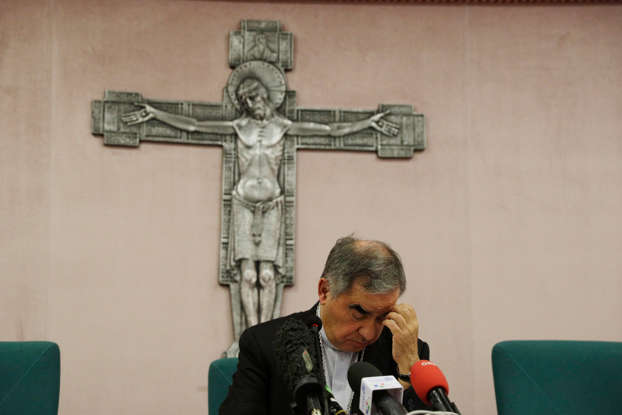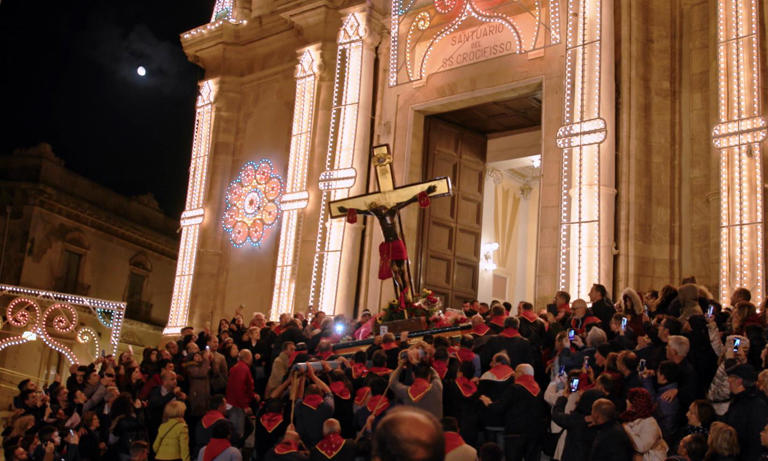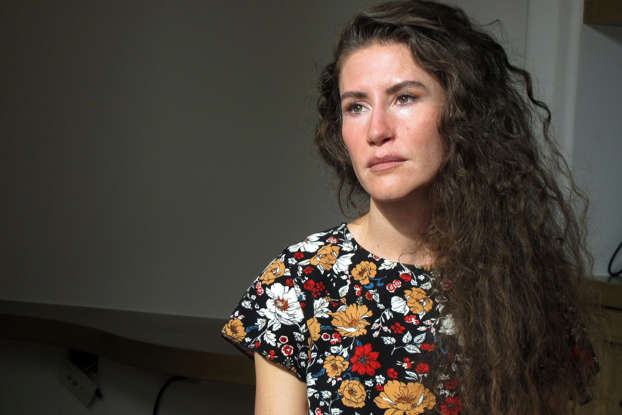The Vatican's 'trial of the century,' a Pandora's box of unintended revelations, explained










The Vatican's 'trial of the century,' a Pandora's box of unintended revelations, explained
Verdicts are expected Saturday for a cardinal and nine other defendants in the most complicated financial trial in the Vatican's modern history:
a case featuring a Hollywood-worthy cast of characters, unseemly revelations about the Holy See and questions about Pope Francis ’ own role in the deals.
The trial had initially been seen as a showcase for Francis’ reforms and his willingness to crack down on alleged financial misdeeds in the Vatican, which long had a reputation as an offshore tax haven.
But after 2 1/2 years of hearings, no real smoking gun emerged to support the prosecution’s hypothesis of a grand conspiracy to defraud the pope of millions of euros (dollars) in charitable donations.
Even if some convictions are handed down, the overall impression is that the “trial of the century” turned into something of a Pandora’s box of unintended revelations about Vatican vendettas, incompetence and even ransom payments that ultimately cost the Holy See reputational harm.
WHAT WAS THE TRIAL ABOUT?
After a two-year investigation that featured unprecedented police raids in the Apostolic Palace, Vatican prosecutors in 2021 issued a 487-page indictment accusing 10 people of numerous financial crimes, including fraud, embezzlement, extortion, corruption, money laundering and abuse of office.
The main focus involved the Holy See’s 350 million euro investment in a luxury London property. Prosecutors allege brokers and Vatican monsignors fleeced the Holy See of tens of millions of euros in fees and commissions, and then extorted the Holy See for 15 million euros ($16.5 million) to cede control of the property.
The original London investigation spawned two tangents that involved the star defendant, Cardinal Angelo Becciu, once one of Francis’ top advisers and a onetime papal contender.
Chief prosecutor Alessandro Diddi is seeking prison sentences from three to 13 years for each of the 10 defendants, as well as the confiscation of some 415 million euros ($460 million) in damages and restitution.
HOW DOES THE CARDINAL FIT IN?
Becciu wasn’t originally under investigation in the London deal since he had been transferred from the Vatican secretariat of state to the saint-making office before the key London transactions occurred.
But he became enmeshed after prosecutors began looking into other deals, including 125,000 euros in Vatican money that he sent to a diocesan charity in his native Sardinia.
Prosecutors alleged embezzlement, since the charity was run by his brother. Becciu argued that the local bishop requested the money for a bakery to employ at-risk youths, and that the money remained in the diocesan coffers.
Becciu is also accused of paying a Sardinian woman, Cecilia Marogna, for her intelligence services. Prosecutors traced some 575,000 euros in transfers from the Vatican to her Slovenian front company.
Becciu said he thought the money was going to be used to pay a British security firm to negotiate the release of a Colombian nun who had been taken hostage by Islamic militants in Mali in 2017. Marogna, who is also on trial, denied wrongdoing.
THE MYSTERIOUS MONSIGNOR PERLASCA
No figure in the trial was as intriguing as Monsignor Alberto Perlasca, who ran the office that managed the Vatican’s sovereign wealth fund, with estimated assets of 600 million euros (around $630 million).
It was Perlasca who signed the contracts in late 2018 giving operative control of the London property to London broker Gianluigi Torzi, another defendant who is accused of then extorting the Vatican for 15 million euros to get the property back.
Because of his intimate involvement in the deal, Perlasca was initially a prime suspect. But after his first round of questioning, he fired his lawyer, changed his story and began cooperating with prosecutors.
Perlasca escaped indictment and was even allowed to be listed as an injured party, enabling him to possibly recover damages.
Only during the course of the trial did it emerge that Perlasca had been manipulated into changing his story to turn on Becciu, his former boss.
THE MYSTERIOUS WOMEN WHO COACHED HIM
In a trial that had plenty of surreal twists, perhaps none was as jaw-dropping as when a controversial figure from the Vatican’s past emerged as having had a starring role in coaching Perlasca to change his testimony.
Public relations specialist Francesca Chaouqui had previously served on a papal commission tasked with investigating the Vatican’s murky finances.
She is known in Vatican circles for her role in the “Vatileaks” scandal of 2015-2016, when she was convicted by the same tribunal of conspiring to leak confidential Vatican documents to journalists and received a 10-month suspended sentence.
Chaouqui openly nurtured a grudge against Becciu because she blamed him for supporting her Vatileaks prosecution. She apparently saw the investigation into the London property as a chance to settle scores.
And so it emerged in late 2022, when Perlasca was being questioned on the stand, that Chaouqui had engaged in an elaborate plot with a Perlasca family friend to persuade the prelate to turn on Becciu.
“I knew that sooner or later the moment would come and I would send you this message,” Chaouqui wrote Perlasca in a text message that was entered into evidence.
“Because the Lord doesn’t allow the good to be humiliated without repair. I pardon you Perlasca, but remember, you owe me a favor.”
Diddi, the prosecutor, hasn’t said what, if any, charges are pending for anyone involved in the Perlasca testimony saga.
THE POPE’S OWN ROLE
Francis made clear early on that he strongly supported prosecutors in their investigation.
But the trial produced evidence that his involvement went far beyond mere encouragement.
Defense lawyers discovered that the pope had secretly issued four decrees during the investigation to benefit prosecutors, allowing them to conduct intercepts and detain suspects without a judge's warrant.
Lawyers cried foul, arguing such interference by an absolute monarch in a legal system where the pope exercises supreme legislative, executive and judicial power violated their clients' fundamental rights and robbed them of a fair trial.
Diddi argued the decrees served as a “guarantee” for the suspects.
In addition, witnesses testified that Francis was very much aware of key aspects of the deals in question, and in some cases explicitly authorized them:
The former head of the financial intelligence agency who is on trial said Francis explicitly asked him to help the secretariat of state negotiate the exit deal with Torzi;
Becciu testified Francis had approved spending up to 1 million euros to negotiate the nun’s freedom;
Becciu’s onetime secretary, who is on trial, said Francis was so pleased with the outcome of the Torzi negotiation that he paid for a celebratory group dinner at a fancy Roman fish restaurant.
In a religious hierarchy where obedience to superiors is a foundational element of a vocation, defense lawyers argued their underling clients merely obeyed orders from the pope on down. That included negotiating the exit strategy with Torzi, who was previously unknown to the Vatican but was brought into the deal by a friend of Francis.
“Torzi was introduced by Giuseppe Milanese, who was a friend of the pope’s, so why wouldn’t we trust him?” said Massimo Bassi, a lawyer for another of the defendants.
Milanese wasn't charged. Torzi denied wrongdoing.
- Story by Nicole Winfield • The Independent
The pope says he wants to be buried in the Rome basilica, not in the Vatican









The pope says he wants to be buried in the Rome basilica, not in the Vatican

ROME (AP) — Pope Francis says he wants to be buried in the Rome basilica of St.
Mary Major, not in the grottoes of the Vatican like other popes, so he can be near his favorite icon of the Madonna.
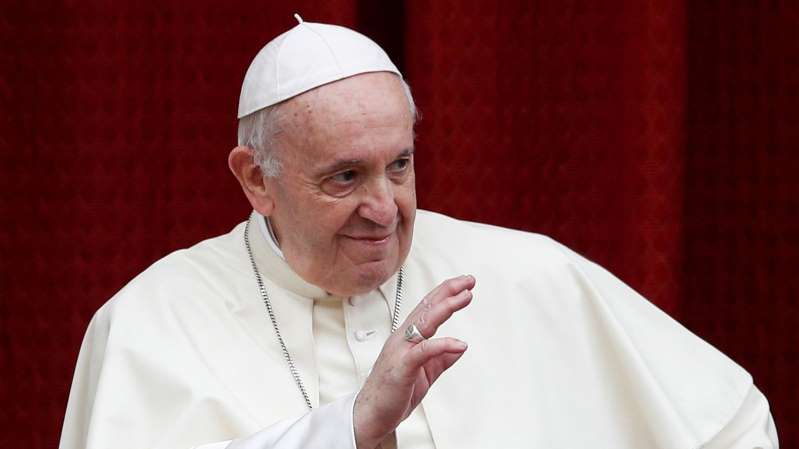
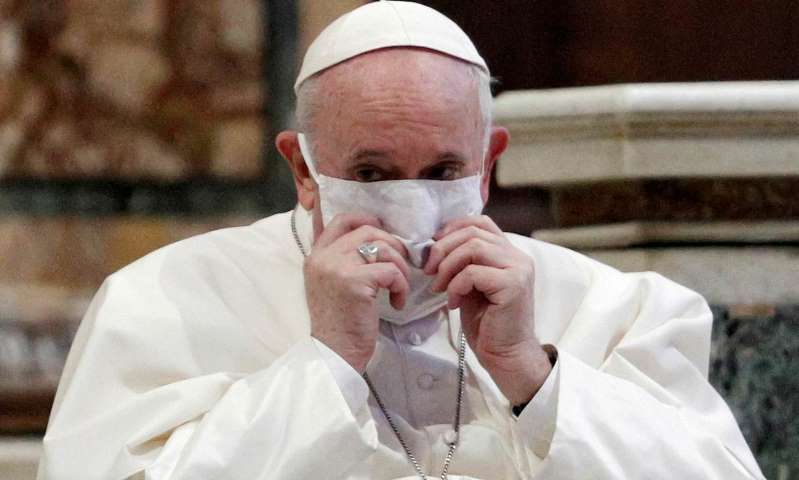
Francis, who turns 87 on Sunday, also said he never thought about resigning this year despite a series of health scares. He said he has a trip confirmed to Belgium
next year and visits under consideration to Polynesia and his native Argentina.
“It is true that all journeys are now rethought,” Francis told N+ of Mexican broadcaster Televisa. “If they’re close by, they can be done. If they’re farther away
they are rethought. There are limits.”
It was Francis’ first interview since his latest bout of acute bronchitis, which forced the cancellation of a trip this month to Dubai to participate in the U.N. climate
conference. Francis,who had part of one lung removed as a young man, appeared in good form and said he was now recovered and feeling fine.
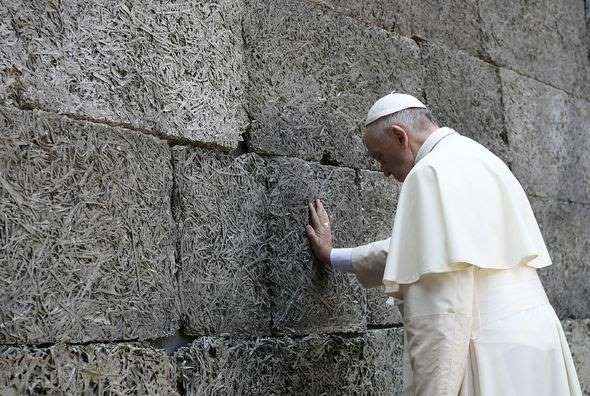
While the job of pope is for life, Francis reconfirmed the possibility of resignation and said he has to prepare for any possibility. “I ask the Lord to say enough,
at some point, but when he wants me to,” he said.
Francis has already said if he retires, as Pope Benedict XVI did in 2013, he would want to live outside the Vatican somewhere in Rome in a residence
for retired priests. Francis has long emphasized his role as bishop of Rome and has a particular devotion to an icon of the Virgin Mary on
display in the St. Mary Major basilica near Rome's main train station.
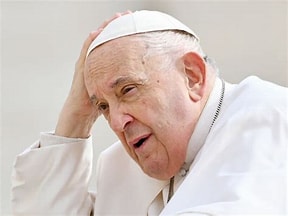
After every trip, for example, Francis goes to the basilica to pray before the Salus populi Romani (Salvation of the people of Rome), a Byzantine-
style painting that features an image of Mary, draped in a blue robe, holding the infant Jesus who in turn is holding a jeweled golden book.
“It’s my great devotion,” Francis said, adding that he had already decided he wanted to be buried nearby in the basilica. “The place is already prepared."
Francis had two bouts of bronchitis this year and was hospitalized for nine days in June to repair an abdominal hernia and have intestinal scar tissue
removed. He has been using a wheelchair and cane for over a year due to strained knee ligaments.
Many popes are buried in tombs in the grottos underneath St. Peter's Basilica or in side chapels of the basilica itself, including all of Francis' recent predecessors.
On travel, Francis confirmed that a trip to his native Argentina was “pending” and that the country's new president, Javier Milei, had invited him. Francis has been
dogged by questions during his entire 10-year papacy about why he hasn't returned home, questions that have only intensified following Milei's unexpected victory.
During the campaign, the self-described “anarcho-capitalist” called Francis an “imbecile” for defending social justice and a “representative of malignance on Earth.”
Francis, who had a long conversation with Milei after he won, seemed to have forgiven him.
“In an election campaign, things are said ‘in jest' — they are said seriously, but they are provisional things, things that are used to create a bit of attention, but
which later fall away by themselves,” Francis said. “You have to distinguish a lot between what a politician says in the election campaign and what he or she is really
going to do afterwards, because then comes the moment of concrete things, of the decisions.”
Francis' planned visit to Belgium is to celebrate the 600th anniversary of the country’s two main Catholic universities. In a statement Wednesday welcoming Francis’
confirmation of the visit, Belgium’s bishops said Francis was expected to stay a day or two, with a date still to be determined.Pope Francis delivers his blessing during the weekly general audience at the Vatican, Wednesday, Dec. 13, 2023.
- Story by By NICOLE WINFIELD, Associated Press
A Black Jesus review – religious rites and refugees collide in Sicilian village










A Black Jesus review – religious rites and refugees collide in Sicilian village
‘Let us in, we are poor pilgrims tired from a long journey.” Joseph, Mary and Jesus are the original spurned refugees in a nativity re-enactment in the Sicilian village of Siculiana, which two millennia on from biblical times is now on the frontline for receiving those fleeing oppression and poverty in Africa. But there’s a paradox in this village of 4,500: while some residents campaign against the local refugee centre and greet the arrivals with racism, the Jesus icon venerated at a festival here each year is (as per this film’s title) black.
Only the Africans point out this contradiction in this radiantly photographed and thorough documentary by director Luca Lucchesi, whose father is from Siculiana; it is also produced by Wim Wenders. But if irony isn’t the local speciality, there are reasons for the lack of self-awareness.
The village, like much of rural Europe, is economically struggling, and the residents want to keep what they have. They cling to their religious rite, carrying the crucifix through the streets, like an identitarian lifeboat in these stormy waters. “Italy is finished,” bemoans one old-timer, who himself left Sicily as a young man to work on German construction sites. Yet another irony: in its apparently terminal decline, Siculiana stands to benefit from the newcomers’ input and energy.
With the help of a sympathetic language teacher, one refugee called Peter resolves to drag Siculiana down the path of integration by applying to be a porter for the icon during the festival. Like this teacher pep-talking some embarrassed-looking Italian schoolkids about letting go of their prejudices, this late storyline is aiming for an uplifting multicultural denouement – and momentarily appears to get it, as Africans help hoist the sculpture.
It is a truly moving moment but, after disappointment quickly follows, one that shows the fragility of symbolic gestures. With Siculiana’s newest residents facing a troubling future, and the locals’ apparent complicity, the words of one woman reverberate on: “Jesus became black because of all of our sins.”
• A Black Jesus is available on True Story on 15 December.
Recordings show how the Mormon church protects itself from child sex abuse claims









Recordings show how the Mormon church protects itself from child sex abuse claims
Paul Rytting listened as a woman, voice quavering, told him her story.
When she was a child, her father, a former bishop in The Church of Jesus Christ of Latter-day Saints, had routinely slipped into bed with her while he was aroused, she said.
It was March 2017 and Rytting offered his sympathies as 31-year-old Chelsea Goodrich spoke. A Utah attorney and head of the church’s Risk Management Division, Rytting had spent about 15 years protecting the organization, widely known as the Mormon church, from costly claims, including sexual abuse lawsuits.
Rytting had flown into Hailey, Idaho, that morning from Salt Lake City, where the church is based, to meet in person with Chelsea and her mother, Lorraine.
After a quick prayer, he introduced himself and said he was there “to look into” Chelsea’s “tragic and horrendous” story.
Chelsea and Lorraine had come to the meeting with one clear request: Would the church allow a local Idaho bishop, which in the Mormon church is akin to a Catholic priest, to testify at John Goodrich’s trial? Bishop Michael Miller, who accompanied Rytting to the meeting, had heard a spiritual confession from Chelsea’s father shortly before John Goodrich was arrested on charges of sexually abusing her.
While the details of his confession remain private, the church swiftly excommunicated Goodrich.
Audio recordings of the meetings over the next four months, obtained by The Associated Press, show how Rytting, despite expressing concern for what he called John’s “significant sexual transgression,” would employ the risk management playbook that has helped the church keep child sexual abuse cases secret. In particular, the church would discourage Miller from testifying, citing a law that exempts clergy from having to divulge information about child sex abuse that is gleaned in a confession. Without Miller’s testimony, prosecutors dropped the charges, telling Lorraine that her impending divorce and the years that had passed since Chelsea's alleged abuse might prejudice jurors.
Rytting would also offer hundreds of thousands of dollars in exchange for a confidentiality agreement and a pledge by Chelsea and Lorraine to destroy their recordings of the meetings, which they had made at the recommendation of an attorney and with Rytting's knowledge.
Today, John Goodrich, who did not respond to the AP’s questions, is a free man, practicing dentistry in Idaho.
“Going into this meeting with Rytting, I felt like it would be very clear, once everything’s laid out that, look, this is not something that we want to cover up,” said Eric Alberdi, a church member who attended the meetings as Chelsea’s advocate and also made recordings, which he shared with the AP.
“This is something that we want to uncover for a number of reasons, so that John … doesn’t do this again. So that Chelsea can move forward,” said Alberdi, who was not bound by the confidentiality agreement and who has since left the church. “You know, covering this up did not make any sense.”
In a statement to the AP, the church said “the abuse of a child or any other individual is inexcusable," and that John Goodrich, following his excommunication, "has not been readmitted to church membership.”
Alberdi's recordings provide an unprecedented record of the steps the church normally takes behind closed doors to keep allegations of child sex abuse secret – steps that can leave predators free and children at risk.
“How many people can know the truth and choose to pretend they don’t and leave others at risk of the same abuse and they know it and they just don’t care?” Lorraine Goodrich said. “I don’t understand that. I’ll never understand that.”---
Two years earlier, in the spring of 2015, Chelsea Goodrich, then a 29-year-old graduate student in psychology living in Southern California, began to confront disturbing memories.
While her peers dated and created lasting relationships, she filled with anxiety and dread at the prospect.
“Instead of wanting to have a relationship, I just remember feeling terror and confusion and kind of disgust, like all at once, about it,” she said during a series of interviews with the AP.
Her memories included several occasions, she recalled, when John Goodrich slipped into her bed at night in their house in Mountain Home, Idaho, to spoon her while he was aroused, pushing himself against her backside. On one occasion, when she was 9, she remembered her father had apologized to her for being aroused while they were playing in the family swimming pool and told her not to tell her mother.
The last similar incident Chelsea recalls occurred during a school field trip to Washington, D.C., where her father admits he climbed into bed with her in a state of arousal and slipped close behind her. John Goodrich admitted that during a recorded conversation, obtained by the AP, with Chelsea, Lorraine and one of Chelsea’s brothers.
Lorraine and Chelsea had been recording their confrontations with John about the alleged abuse, which they would later turn over to police.
While grappling with these memories, Chelsea met a Mormon friend she came to trust and with whom she shared these unsettling remembrances. Her new friend told her that her father, Paul Rytting, was a high church official who often dealt with sexual abuse complaints and suggested Chelsea contact him.
Unbeknownst to Chelsea, who believed Rytting’s main responsibility was to aid victims, at about that time he was deeply involved in defending the church in a highly publicized West Virginia child sex abuse lawsuit. Several Mormon families had accused the church of allowing a Mormon sex abuser, Christopher Michael Jensen, to babysit for their children, whom he allegedly abused. Jensen was sentenced to serve 35 to 75 years in prison after he was found guilty of abusing two of the children.
As revealed by the AP last year, Rytting made sworn statements in that case – which were sealed by a judge and obtained by the AP -- describing the management of the secretive church Helpline, a phone number set up by the church for bishops to report instances of child sex abuse. Church officials say that they don’t keep any records of the reports to the Helpline.
Rytting also revealed the lengths to which the church goes to ensure confidentiality for Mormon perpetrators who make spiritual confessions.
“Disciplinary proceedings are subject to the highest confidentiality possible,” Rytting said in one affidavit. “If members had any concerns that their disciplinary files could be read by a secular judge or attorneys or be presented to a jury as evidence in a public trial, their willingness to confess and repent and for their souls to be saved would be seriously compromised.”
Rytting did not respond to telephone calls or an email with a list of questions. In its statement the church noted that Goodrich's “communications with his bishop were protected by Idaho state law. Only the perpetrator could release the bishop from his obligation under the clergy penitent privilege and he refused to do so.”
After meeting Rytting’s daughter, Chelsea travelled with her to Salt Lake City and met Paul Rytting while staying at the family home.
At that time, Chelsea didn’t feel ready to discuss her memories and kept them to herself, she said. But she eventually told her mother. And when Lorraine Goodrich confronted her husband in their Idaho home, in July of 2015, John confirmed becoming aroused while around his daughter -- but denied any direct sexual contact, according to recordings of the conversations.
In one recorded conversation with Chelsea and Lorraine, he blamed the devil for his decision to climb into bed with his 13-year-old daughter after hearing sexual activity in an adjoining hotel room during the trip to Washington.
“The adversary I’m sure worked on me,” he said, using a Mormon term for Satan. “And that’s when it was going through my mind when I climbed in bed with Chelsea and was really aroused … with the intent of spooning and snuggling you but I didn’t.”
With his family and marriage in turmoil, John revealed details of his relationship with Chelsea to visiting relatives, according to a written statement from the relatives which was ultimately submitted to authorities. They urged him to go to the police. When John said he’d rather talk with a Mormon bishop, the Goodrich relatives drove him to Miller’s home, where John made his confession.
Less than a year later, on Sept. 1, 2016, Chelsea and her mother met with Mountain Home police and played the recordings of their conversations with John. The next day, after a nearly two-hour interview at police headquarters, officers arrested him.
“Nothing happened,” John protested, as police cuffed him during a video interview obtained by the AP.
“I’m not ashamed of anything.”
It was then that Chelsea decided to enlist Rytting’s help and began corresponding with him by email to persuade him to allow Miller to testify against her father.
Chelsea and Lorraine also let Rytting know that church officials may have known about John Goodrich and his daughter for years. John told them, in conversations that were also recorded, that he’d “repented” details of his relationship with Chelsea to several local church leaders. Rytting told them that church leaders said they did not recall hearing any such confessions.
Then, 10 days after John’s arrest in Mountain Home, another woman stepped forward with additional allegations of sex abuse after learning of the case against John. The 53-year-old single mother accused him of having nonconsensual sex with her after giving her the drug Halcion, a controlled substance John often used to sedate patients during dental procedures. She alleged that Goodrich drugged her the previous July after she cut off a sexual relationship with him.
The AP is not naming the woman because it does not identify people who make allegations of sexual abuse without their consent.
As detectives investigated the new allegations, John Goodrich, who was still facing charges in Chelsea's case, called the woman at least four times, in conversations she recorded and which the AP obtained. In these conversations, Goodrich asked her to lie to police while admitting he drugged her even as he tried to minimize his actions and repeatedly apologized.
“It was fun as heck, but it was wrong,” he said in a recorded conversation. “Just out of principle it was wrong, and I’m just mad as hell at myself.”
In July 2017, prosecutors dropped charges against John Goodrich related to Chelsea's allegations.
Six months later, a prosecutor in a neighboring county was crafting a plea deal in which he again would escape sex crime charges.
In the end, John Goodrich pleaded guilty to distribution of a controlled substance, Halcion, and a judge sentenced him to 90 days in jail and three years of probation.---
At the initial meeting with Chelsea and Lorraine, Rytting said the clergy-penitent privilege law made it next to impossible for Miller to testify against John Goodrich. Now, four months later, he was back in Hailey with an offer.
Much had changed for Lorraine and Chelsea in the meantime. They’d begun to feel ostracized by the Mormon community. Miller’s wife had even removed them from a local church community “sisters” email list, they told Rytting.
Miller had been an advocate for Chelsea.
During the first meeting with Rytting, Miller said John Goodrich, before his excommunication, had tried to backtrack on what he’d told Miller in confession.
“John told me one thing, and then kind of toned it way down to the stake president,” said Miller, referring to a higher-ranking church official who oversees several local jurisdictions. “He told the stake president, ‘Well, that’s not a big deal.’ I go, ‘Yeah, it’s a big deal.’”
“So we know he’s lying, and we know he’s lying at every level,” Rytting responded.
Reached by phone by the AP, Miller refused to discuss details. “It’s clergy privilege,” he said. “If I say anything, (John Goodrich) can sue me for millions of dollars.”
With Rytting in town again, Lorraine and Chelsea first made it clear that they were devastated the prosecutor had dropped the criminal case, according to the recordings.
“(The prosecutor) said ‘Too bad the bishop couldn’t testify,’” Lorraine told Rytting.
Rytting sounded surprised. He had not known coming into the meeting that the case was dropped, he said. He told them that the church perhaps could reach out to the prosecutor to help get things restarted.
“The message to this prosecutor is, you’ve got several pretty clear-cut instances where a predator, a sexual predator, has admitted,” Rytting said. “And then the victims have provided information. But you don’t feel any need to protect the general public?”
“She did say that if the bishop could come forward and tell, then we would have had a case. But there’s nothing,” Lorraine repeated.
The prosecutor, Jessica Kuehn, now works for the Pennsylvania attorney general’s office and did not respond to a request for comment. The AP couldn’t determine if the church ever followed up with her about the case.
About an hour into the meeting, Rytting changed the subject abruptly.
“Well, should we talk about why I’m here?” Rytting asked. “I have authorization up to $300,000.”
The offer stunned Chelsea and Lorraine. Months earlier, Rytting told them by email that the church was prepared to pay them $90,000 - an offer the women were considering.
The payment would be made on the condition that Chelsea and her mother sign an agreement in which they promised never to use Chelsea’s story as a basis for a lawsuit against the church – and that they never acknowledge the existence of the settlement.
And there was another key provision: “Second paragraph, I’ll be interested in your response,” Rytting said, while reviewing the document with them.
“The recommendation is that you acknowledge that there’s been some recordings made of all of our communications and that you agreed to destroy those recordings within 10 days of signing this,” he said.
Nondisclosure agreements – or NDAs, as they are commonly known - have been used frequently by the Mormon church and other organizations, including the Catholic Church, as well as individuals, to keep sex abuse allegations secret. In addition to her settlement with the church, Chelsea also settled a lawsuit against her father.
In one of their recorded conversations, Rytting told Chelsea that he could check Helpline records, used by Miller to report details of John Goodrich’s confession, to see whether her father had ever previously confessed to another bishop to abusing her.
But in the West Virginia abuse case against the church, Rytting gave sworn, written testimony in which he said no one at the Helpline keeps records. And another ranking church official testified in a case in Arizona that the records are destroyed at the end of each day. In comments to the AP, the church declined to clarify Rytting’s apparent contradiction about whether the church keeps records on the Helpline.
Still, at their final meeting, Rytting assured Chelsea and Lorraine that church officials denied hearing John Goodrich confess previously to abusing his daughter, a claim the church backed in its statement to the AP. He urged them to accept the funds the church was offering and sign the nondisclosure agreement promising they would never sue the church.
“When John Goodrich engaged in abuse or any other criminal or sexual misconduct, he was acting in an individual capacity and NOT as an agent of the Church,” Rytting wrote, ignoring the fact that Goodrich was a bishop at the time. “Accordingly, any damages arising from such misconduct will be apportioned to Mr. Goodrich and not to the Church.”
Chelsea and Lorraine, distanced from their family and community, and struggling financially, accepted this assessment and signed the agreement, which did not prevent Chelsea from telling her story.
Earlier this year, Chelsea decided to share it with the AP.
She had tried going to the church for help. She’d tried the criminal justice system. But John was free with access to children through his family and dental practice.
“Right now, my main concern continues to be other children,” she said.
Articles-Latest
- Koran burning conviction sparks fury as blasphemy law 'returns to UK'
- Robert Francis Prevost - Pope Leo XIV
- Pope Francis' death follows recent health challenges. Here's what we know about how he died.
- Easter April 2025 - international Celebrations
- The Rule of the twelve psalms -Worthy is the Lamb
- Religion in Africa Before Christianity and Islam
- 6 The Origin of Yahweh
- Dumo Di Milano
- What Did the Crow Tribe Believe In: Discover The Beliefs!
- 7 Reasons Historic Christianity Rejects the Book of Enoch
- 8 Breathtaking Mountain Monasteries Around the World
- Ethiopian Bible is oldest and most complete on earth
- Muhammad Muhammad was a prophet and founder of Islam.
- World Day of the Poor – SVP Christmas Campaign 2024
- Pope Francis to open 5 sacred portals on Christmas Eve — for a ritual that’s never been done before
- The 144,000 in Revelation
- Over 73 dead bodies 'used for meditation', 600 crocs in a pond, found in two Thai temples
- Occultism: Western Occult Tradition
- What is a Mudra
- Blood Sacrifices: Ancient Rituals of Life and Death
Articles-Most Read
- Home
- Let There Be Light
- Plants that feel and Speak
- The Singing Forest
- The Singing Forest-2
- Introduction
- Meditation
- Using Essential Oils for Spiritual Connection
- Heaven Scent
- Plants that Feel and Speak-2
- Purification
- Making the Spiritual Connection
- Anointing
- Essential Oils: The unseen Energies
- The Sanctity of Plants
- The Aroma Of Worship-Foreward
- The Aroma Of Worship - Introduction
- Methods Of Use
- Spiritual Blending
- Handling and Storage







